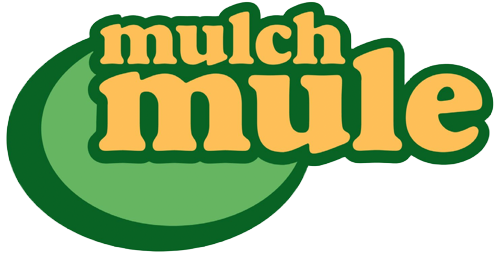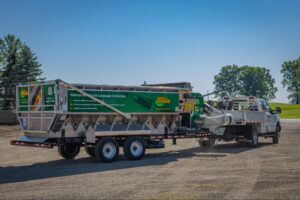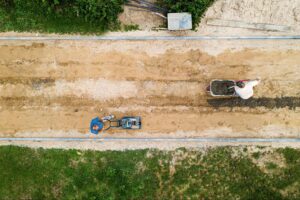Launching or expanding a landscaping business is an exciting opportunity driven by technological innovation, sustainability, and evolving safety standards. Whether you are an experienced professional or new to the field, balancing business acumen, industry expertise, and strong leadership is critical for success.
This article outlines practical strategies, clear examples, and actionable insights to build a profitable, safe, and efficient operation while integrating modern equipment to streamline your workflow. The landscaping sector continues to be poised for robust growth, making this the ideal time to establish or enhance your business.
Why Now Is the Optimal Time to Launch a Landscaping Business
The landscaping industry is evolving rapidly due to technological advancements and a growing focus on eco-friendly practices.
4 Key reasons to start or upgrade your landscaping business now include:
- Rising Demand for Quality Services: More property owners are investing in professional landscaping to enhance curb appeal and property value. Property management companies are also increasingly seeking comprehensive, year-round services to keep their communities well-maintained.
- Technology-Driven Advancements: From digital project management platforms to automated equipment, technology can significantly reduce administrative workloads and improve accuracy on the job. Adopting these innovations early grants a strong competitive advantage.
- Emphasis on Sustainability: Eco-friendly practices—such as water-efficient landscaping designs and the use of native plant species—reduce ongoing costs and enhance community perceptions of your brand.
- Competitive Differentiation: Offering year-round landscaping solutions and advanced material-handling equipment showcases your commitment to efficiency. Customers increasingly look for services that combine reliability, expertise, and the capacity to handle tasks in a timely, safe manner.
These factors create an ideal market environment for sustained growth. By aligning your strategy with emerging trends and making strategic equipment investments, your landscaping business can thrive in one of the most dynamic sectors of the construction and maintenance industries.
Key Skills for Landscaping Business Owners to be Equipped With
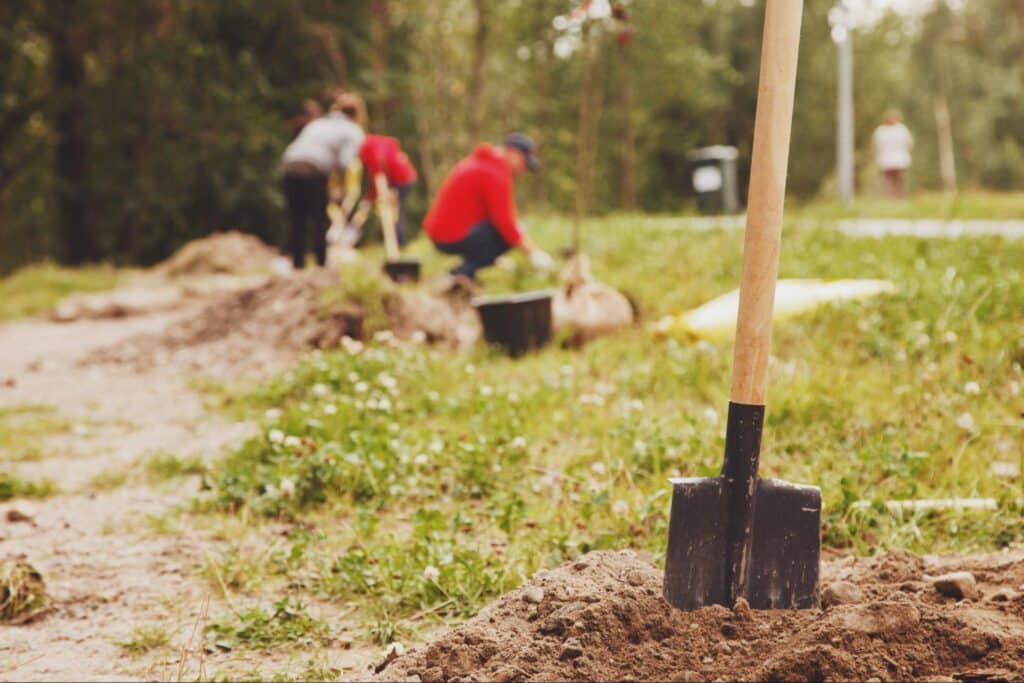
Success in landscaping hinges on a strong foundation of management expertise, technical knowledge, and effective team leadership. Below are the core skills you need to master.
Business and Financial Management
A robust financial strategy sits at the heart of a profitable operation. Consider these approaches:
- Budgeting and Cash Flow: Develop a detailed budget that accounts for seasonal demand fluctuations. Use financial management software to track expenses, schedule payments, and calculate returns on large investments, including purchasing or leasing advanced machinery.
- Strategic Pricing and Marketing: Research local market rates and adjust your pricing based on the specific services you offer. Combine competitive pricing with digital marketing strategies and satisfied customer testimonials to raise brand awareness and attract new projects.
- Smart Equipment Investment: Prioritize tools and machinery that can automate labor-intensive tasks. By reducing manual labor requirements, you streamline operations and improve safety on the jobsite. Carefully evaluate each potential purchase based on measurable productivity gains and long-term cost savings.
Industry Knowledge and Expertise
Up-to-date awareness of aesthetic principles, sustainable methods, and regulatory compliance are pillars of an effective landscaping provider:
- Design Fundamentals and Sustainability: Understanding core design concepts boosts your ability to create visually appealing landscapes that flourish. Incorporate eco-friendly techniques like native landscaping and water-saving irrigation systems to differentiate your services.
- Regulatory Compliance and Technological Adaptation: Stay informed about local zoning laws, licensing requirements, and environmental regulations. Embrace modern innovations for project management, customer communication, and safe machinery operation to keep your business responsive and compliant.
- Staying Current with Emerging Trends: Regularly review industry publications to keep pace with the latest innovations.
Leadership and Team Management
Effective leadership propels a successful operation, especially in a fast-paced industry:
- Team Building and Training: Recruit skilled professionals and ensure ongoing training on new techniques, tools, and safety protocols. For example, referencing the Mulch Mule Operating Manual helps your staff quickly master advanced equipment features.
- Safety and Accountability: Promote a safety-first mindset by holding regular drills, mandating the use of protective gear, and ensuring transparent incident reporting. Various industry sources and safety analyses indicate that landscaping work can expose employees to repetitive strain and ergonomic risks. Emphasizing proper tool handling and regular safety training can help mitigate these hazards. Adhering to OSHA guidelines for landscaping not only reduces the risk of injuries but also builds confidence among your team.
Combined with a willingness to adapt to changing market conditions, these skill sets lay a strong foundation for your business.
3 Core Principles for Landscaping Business Startups: Efficiency, Safety, and Profitability
Maintaining three key pillars—efficiency, safety, and profitability—creates a stable framework for daily operations and long-term growth.
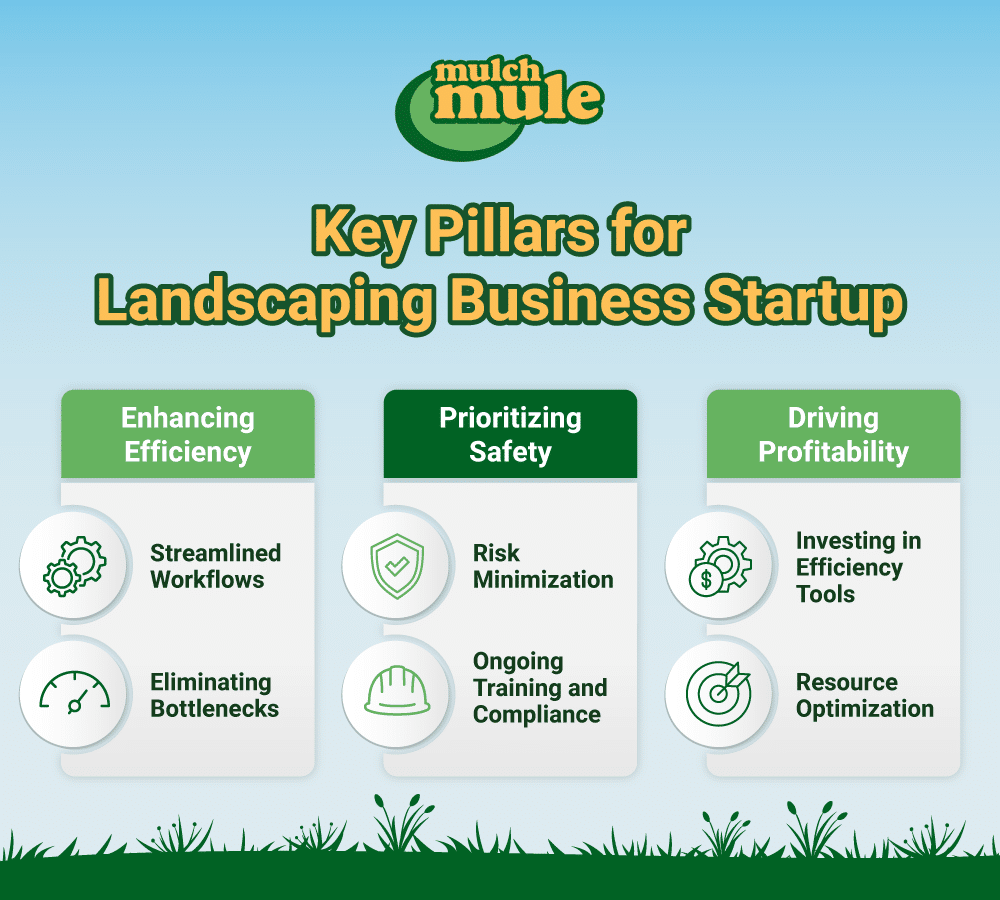
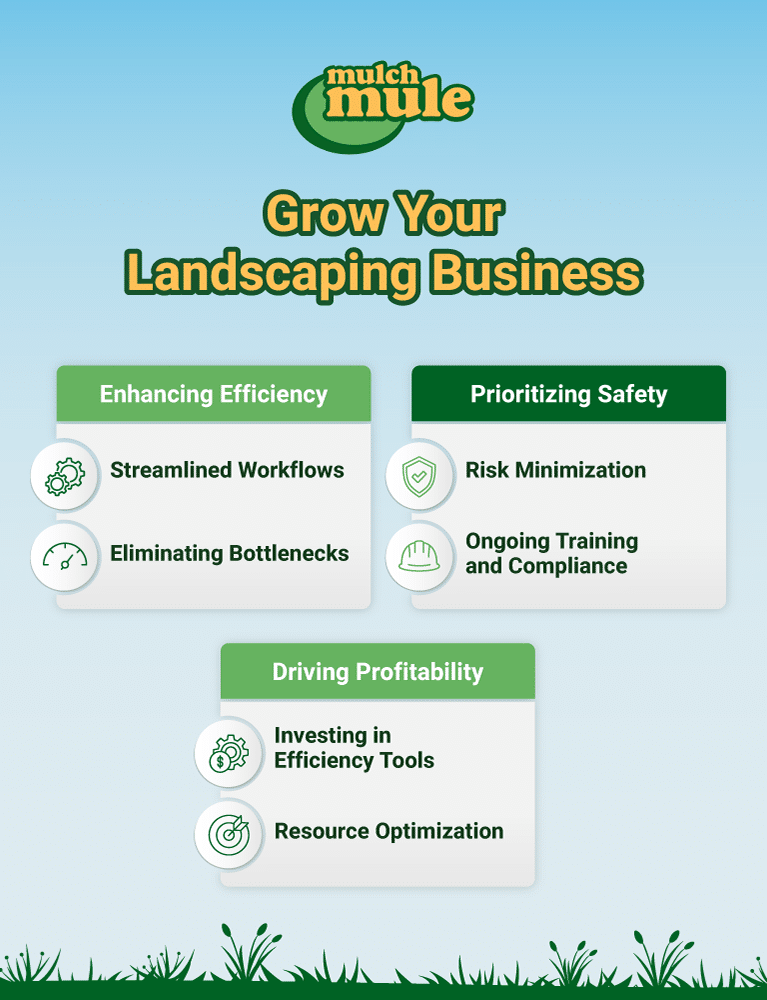
1) Enhancing Efficiency
- Streamlined Workflows: Lean scheduling and the integration of automated tools reduce busywork and boost operational speed. Investing in scheduling software and tool-tracking apps can free up your team for higher-value tasks.
- Eliminating Bottlenecks: Continuously monitor your processes to identify and address sources of delay. For instance, reorganizing your crew’s daily routine or ensuring that critical tools are well-maintained can significantly reduce downtime.
2) Prioritizing Safety
- Risk Minimization: Selecting equipment designed to reduce physical strain—such as the Mulch Mule—can lower injury risks for your team. Fewer injuries mean saved resources, time, and higher overall morale.
- Ongoing Training and Compliance: Implement regular safety refreshers and ensure that updated protocols are clearly communicated to all staff. Consistent training in the safe operation of tools and equipment helps address risks associated with repetitive tasks and physical strain.
3) Driving Profitability
- Investing in Efficiency Tools: Advanced machinery that expedites project timelines and lowers manual labor costs is a cornerstone of profitability. Automation can lead to more completed projects and improved net revenue.
- Resource Optimization: Use productivity data to guide decisions on purchasing, staff scheduling, and client acquisition strategies. Every hour saved through improved processes directly boosts profit margins.
Leveraging Versatile Year-Round Equipment
A critical component of modern landscaping is adopting machinery suited for multiple applications across all seasons. Whether you’re moving mulch in spring, clearing leaves in autumn, or handling stone and aggregate for winter projects, smart machines make each task more efficient. Versatility is vital for a landscaping business aiming to broaden its portfolio:
- All-Season Capabilities: Investing in equipment that handles mulch, soil, leaves, debris, and stone year-round maximizes utilization. If your trailer or vacuum system works effectively in various weather conditions, you can maintain operations even when competitors pause.
- Reduced Downtime: Multi-functional machinery consolidates several tasks into one. By quickly switching attachments or performing minor adjustments, you keep your crew productive and protect your bottom line.
- Scalability and Confidence: Versatile equipment enables you to manage diverse projects without overstressing your team. Clients appreciate providers who show flexibility and readiness to complete jobs efficiently regardless of seasonal changes or unpredictable weather patterns.
Adopting year-round gear ensures that you’re not only prepared for immediate needs but also positioned to seize unexpected opportunities—from emergency cleanups to offseason upgrades on hardscapes and natural turf areas.
The Impact of Advanced Equipment on Your Landscaping Business
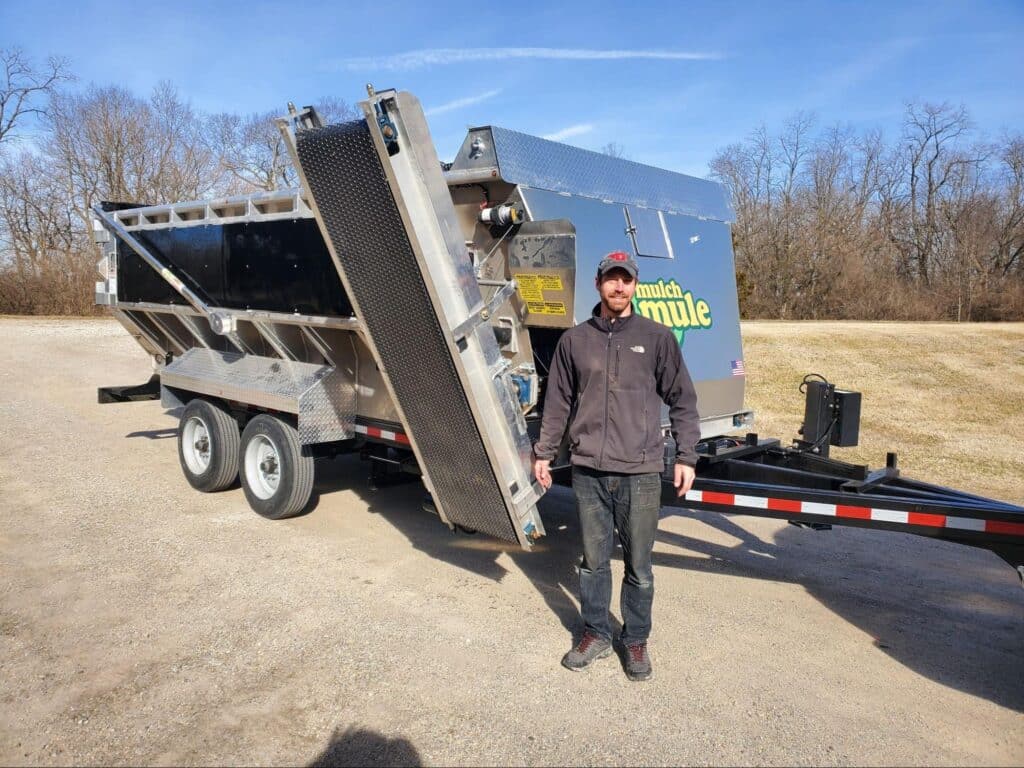
Technology is a core driver of efficient, safe, and profitable operations in landscaping. Automated features can drastically reduce manual labor while enhancing site safety.
Simplified Material Handling
Automation minimizes repetitive tasks such as shoveling or raking, allowing your workforce to focus on specialized duties. A reduction in labor-intensive tasks can lead to faster project completion and higher job satisfaction.
Enhanced Precision and Efficiency
Modern equipment with remote controls and live feed systems ensures consistent, even distribution of materials like mulch, soil, or gravel. Reducing material waste not only boosts efficiency but also reinforces a professional image and customer satisfaction.
Versatility for Year-Round Operations
Whether it’s clearing autumn leaves or transporting heavy aggregate during winter, durable equipment helps maintain operations throughout the year. Consistent availability of services strengthens client relationships and builds a reputation for reliability in all conditions.
Practical Tips for Aspiring Landscaping Entrepreneurs
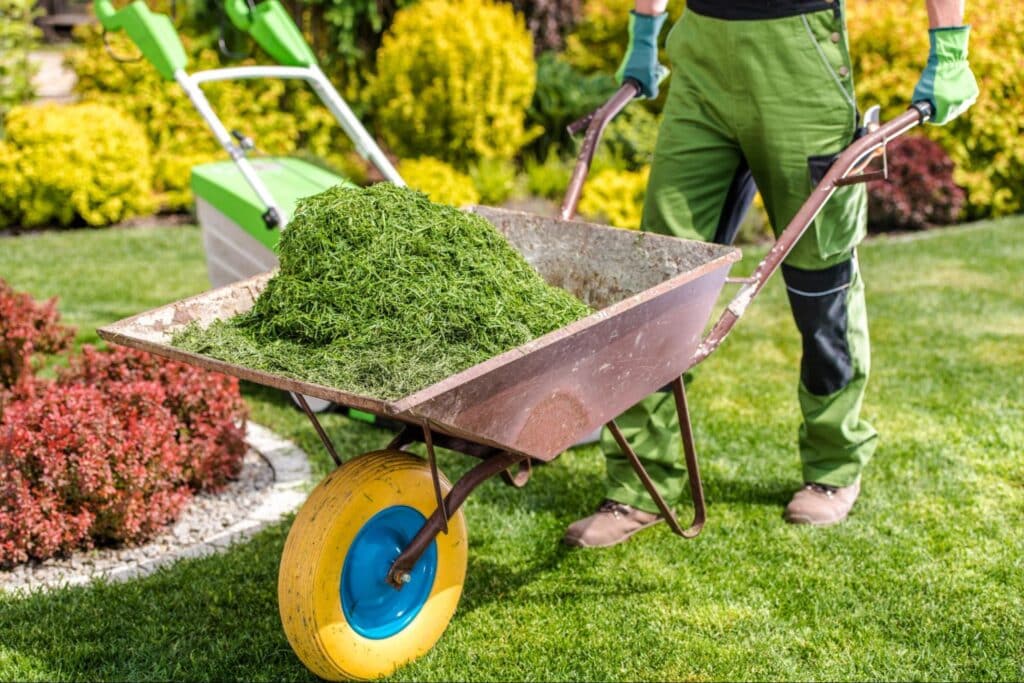
Laying a strong foundation for a landscaping business requires clear objectives, a skilled team, and efficient workflows. Incorporate these strategies:
Develop a Strategic Business Plan
Outline your target market, refine your service offerings, and set growth projections. A comprehensive plan helps you quickly adapt to seasonal demand shifts, changing regulations, or new technology trends.
Invest in Training and Routine Maintenance
Schedule regular training sessions on equipment handling and safety practices—especially when introducing new machinery.
Leverage Digital Scheduling Tools
Automated scheduling software offers a clear view of job progress, crew availability, and impending deadlines. Real-time alerts help mitigate conflicts and ensure timely service delivery.
Build and Nurture Client Relationships
High-quality service, transparent communication about project timelines, and consistent follow-up foster client loyalty. Soliciting feedback and refining your offerings based on client input can drive repeat business and referrals.
Adapt and Innovate Continuously
The landscaping field is dynamic, with frequent advances in equipment, design software, and eco-friendly materials. Stay informed by attending industry events, reading trade journals, and participating in networking groups. Embracing new technologies and practices can distinguish you from competitors.
Click the video below to hear Keegan Minard, the owner of Minards Landscape, talk about his experience starting out in the landscape design industry and how the Mulch Mule has helped him.
Before Mulch Mule they were typically doing 50 to 80-90 yards a mulch a day. Since purchasing the equipment they are seeing double the productivity with the same amount of workers.
Expanding Your Market Reach
Whether you’re planning to scale a small operation or consolidate a larger enterprise, strategically broadening your services and brand presence can significantly improve revenue streams.
Diversification of Services
Expand beyond basic lawn maintenance by adding irrigation, green roof installations, hardscaping, and other value-added services. This expanded suite of offerings can protect your business during seasonal downtimes in traditional landscaping work.
Collaboration and Strategic Partnerships
Partner with local nurseries, property management firms, or HOA boards to offer bundled services. These collaborations can reduce marketing expenses while ensuring a steady influx of projects.
Embracing Community Engagement
Hosting seminars on sustainable landscaping practices or local environmental events shows your commitment to responsible land stewardship. Demonstrating the safe, cutting-edge use of modern equipment can captivate potential clients and enhance your brand’s integrity.
Navigating Industry Challenges and Future Trends
Even with rising demand, the landscaping industry faces challenges such as regulatory changes and competitive pressures. A forward-looking approach will help you remain resilient.
Overcoming Operational Obstacles
Peak seasonal workloads, unpredictable weather, and labor shortages can disrupt schedules. Implement flexible staffing, organized resource allocation, and regular maintenance routines to minimize these disruptions.
Embracing Environmental Regulations
As states adopt stricter environmental rules, compliance is essential for maintaining a reputable business. Aligning your operations with guidelines from the U.S. Environmental Protection Agency (EPA) not only fosters community goodwill but also appeals to eco-conscious clients.
Preparing for Future Trends
Emerging technologies—from drones that map landscapes to AI-assisted design software—are shaping the industry’s future. Stay informed by subscribing to trade journals, signing up for industry newsletters, and attending professional expos. Proactive adaptation to innovations like autonomous mowers or modular landscaping solutions can position your business as a modern leader.
Future-Proofing Your Landscaping Business for Long-Term Success
Long-term viability in landscaping hinges on consistent performance tracking, wise investments, and strategic partnerships. Analyzing project timeframes, budgeting prudently, and scheduling routine maintenance on key equipment all contribute to operational efficiency.
Cultivating industry connections—whether through trade associations, community events, or online forums—ensures you remain alert to emerging design trends and regulatory changes. By anticipating shifts in the market and maintaining high-quality standards, you build a foundation that supports sustained success.
Sustainable Innovations and Environmental Considerations
Growing environmental awareness is reshaping the landscaping industry, creating opportunities for businesses that adopt sustainable practices.
Renewable Energy and Green Technology
Incorporate features such as solar-powered lighting and energy-efficient scheduling tools to lower your carbon footprint. Customer feedback and market research increasingly favor companies that display environmental responsibility, offering a competitive edge.
Water Conservation Strategies
Implement advanced irrigation systems, timely watering schedules, and drought-resistant plant options to conserve water. Exceeding client expectations with thoughtful, eco-friendly practices can position your business as an industry leader.
Waste Reduction and Material Recycling
Adopt practices such as composting organic waste and repurposing design materials to support a circular economy. Sustainable practices enhance brand loyalty and can lead to increased referrals and client retention.
Get Your Landscaping Business off on the Right Foot
Success in the landscaping industry requires a steadfast commitment to efficiency, safety, and profitability. By sharpening your leadership skills, adhering to industry best practices, and integrating advanced equipment to reduce manual labor, you can streamline operations, protect your team, and control costs. Regular performance evaluations, staying informed about technological breakthroughs, and cultivating an innovative company culture are key to thriving in an ever-evolving marketplace.
Embrace these strategies, and your landscaping business will be well-positioned for sustainable success. To discover how modern technology can transform your landscaping operations, explore the Mulch Mule trailer further by reaching out for a quote or a live demonstration.
